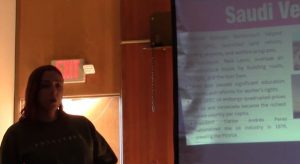Bethlehem-based peacemaker to speak Aug. 17, 19
10 min read
Presenter: Sami Awad of Nonviolence International visited with KEPW and discussed speaking engagements coming up in Lane County Aug. 17 and 19. Rob Tobias:
[00:00:10] Rob Tobias (KEPW, Train of Thought): Bethlehem-based peacemaker coming to Eugene, Springfield, and Florence and doing some speaking engagements, Sami Awad, co-director of Nonviolence International. And you live in Bethlehem?
[00:00:27] Sami Awad (Nonviolence International): I live in Bethlehem in the occupied territories in the West Bank.
[00:00:31] Rob Tobias (KEPW, Train of Thought): Yeah. Well, let’s start there. What is it like where you live?
[00:00:37] Sami Awad (Nonviolence International): Yeah, I wish I could give you any good picture of Bethlehem and life here, but the Palestinian community for decades has been living under a military occupation, including Bethlehem itself, that has been occupied since 1967 by the Israeli military, even though we had a peace process and there has been a Palestinian Authority that was established, even since then, the overall control of everything is under the Israeli military.
[00:01:09] And as we know very well, since October 2023, Gaza has been experiencing a genocide, a violent attack as a response to the attack by Hamas on Israeli communities outside of Gaza. But this proportion is not even a word to describe what the reality of life in Gaza.
[00:01:33] And I actually have family in Gaza. As a Palestinian family, my mother’s family is actually from Gaza. We were able to take some of them out into Egypt, and some others we were not able to take out. And they’re still stuck in the church in Gaza that was actually bombed a couple of weeks ago.
[00:01:54] And in the West Bank where I live, the situation since Oct. 7 has also been very, very difficult, not close to the reality of what life in Gaza is like. We’ve been under strict closure, restrictions on movement, tremendous amounts of violence by settlers. These are Jewish settlers that live in illegal settlements in the West Bank that have just taken up arms with this vengeance towards Palestinians, no matter who they are and hatred towards us.
[00:02:29] And of course, the Israeli army that’s the same, doing a lot of violence towards Palestinians. So life has been difficult. Again, not close to Gaza. I’m able to talk to you. I have internet, I have electricity, I have water. The most basic needs are met here. We have food, we have shops, restaurants that are open. But one thing I would say is, we’re worried. We’re worried in the West Bank: What comes next after they finish with Gaza, which looks like it’s going to be a disaster, they’re talking about reoccupying Gaza, what will life be like for us in the West Bank?
[00:03:03] Rob Tobias (KEPW, Train of Thought): Talk about the hate and vengeance. How much of that got ratcheted up after Oct. 7 and how much already existed before then?
[00:03:12] Sami Awad (Nonviolence International): I mean, you know, we have been in war. We have been in occupation. We have been in a situation where there isn’t this sort of loving relationship between Palestinians and Israelis for a long time.
[00:03:25] Many Israelis just live in the bubble, not concerned, not worried about what’s happening in Gaza, what’s happening in the West Bank. That’s why many of them were actually surprised after Oct. 7, and many of them don’t know the reality of life in the West Bank,… so they live in their bubbles in Tel Aviv, in Netanya, in Haifa, and all of a sudden everything was exposed.
[00:03:46] But instead of questioning the policies of their government and military towards us, there was this rally called by the Israeli establishment to rally people towards even greater hatred, greater resentment, and greater discrimination towards Palestinians.
[00:04:07] I’m going to use the word ‘ugly’ to describe this level of vengeance towards Palestinians for the act of a group that most Palestinians don’t align with and don’t agree with. But then every Palestinian becomes a potential terrorist. Every Palestinian becomes a threat. Every Palestinian, somebody that needs to pay the price for what that group did.
[00:04:34] Rob Tobias (KEPW, Train of Thought): What is stopping the aid from getting to people?
[00:04:38] Sami Awad (Nonviolence International): Well, the simple answer: Israel is stopping the aid. Israel is stopping the aid. In an area four times bigger than Manhattan when you have only four locations where aid is coming in that are completely controlled by the Israeli military and we have seen people being killed in these areas. Not one or two—80, 100 each time. It’s insane, what’s happening in these areas.
[00:05:04] Yeah, and then now we’re seeing eyewitnesses come out from U.S. soldiers who are there that are saying that they are killing innocent people in these areas where they’re handing out the food. Israel can easily allow the Egyptian border to be opened for aid to come from Egypt into the area. Israel can open more of its borders from inside Israel to allow more aid to come. We’re seeing Israeli right-wing fanatics jumping on trucks and dumping all the aid off the trucks and destroying it. We’ve seen Israeli officials claim and declare that they want Gaza starved. And then so it has been very, very clear Israeli policy to stop the aid.
[00:05:52] And as we have always said, as even major news outlets have always said, ‘Let us in to find the facts. Let the international media in. And we will report on what we see. And if what you claim in Israel is true, we will report that.’ The fact that Israel does not allow international media into Gaza to report on what’s happening.
Even the flights that are flying over Gaza, throwing aid through the parachutes to Gaza, journalists on these flights are not allowed to film and report what they see on the flights, or Israel will stop the planes from flying over again. And so these simple facts raise questions: What does Israel want to hide? And again, the fact is that nobody buys into the propaganda story anymore.
[00:06:47] Rob Tobias (KEPW, Train of Thought): If you’re imagining a path to the end of this cycle of violence, if there is a negotiation, how do we get there? As peacemakers or as people that are listening to all that is going on, obviously it’s really bad right now.
[00:07:06] Sami Awad (Nonviolence International): It’s really bad. And the first thing that needs to happen for any negotiation to take place is the violence needs to stop (Yes), the killing, the bombardment, the starvation, the closures, the attacks by settlers, there has to be strong measures to stop this.
[00:07:26] Israeli government needs to control its violent people and tell them to stop. We need good faith. We need to see signs of good faith that people are really interested in peace.
[00:07:38] One of the reasons I think the peace processes, the multiple processes have failed so far, is that negotiations were not happening out of good faith. They were happening out of political interests and mostly interests for Israel to maintain its grip and to have its security the way it wants it to be. And this is why I think negotiations have failed. And so good faith, as a starting point, allows for us to begin to move forward.
[00:08:05] Now, many people are looking into the final political solution. And then to say, let’s negotiate for that one state, two states, three states, whatever the outcome is. What we are advocating for as people who really believe in peace and justice is not the political solution itself as much as: What is the foundation that is needed to really establish a just and long-term political solution?
[00:08:31] And for us, it starts with the recognition of the equal rights of all the people that live in that land to be in that land, no matter how they identify themselves. If it’s in their national identity, Palestinian, Israeli, or religious identity, Jew, Muslim, or Christian, or whatever identity.
[00:08:50] If you have ancestors in this land, if you have claims in this land that go thousands of years, we all have these claims, then let us acknowledge and recognize that we all have rights in this land and we all want to live in equality, we all want to live in security and prosperity, and then we can see how do we frame that in a political solution.
[00:09:11] Rob Tobias (KEPW, Train of Thought): What are your feelings about Hamas as an entity to negotiate?
[00:09:16] Sami Awad (Nonviolence International): I will start by saying I made it very clear I don’t agree with Hamas. I don’t agree with their policy, their approach, I don’t agree with their ideology And this is something that many, many Palestinians, and this is a debate that takes place within our own Palestinian community.
[00:09:32] Just like in the United States, there are people who don’t agree with certain political parties and certain views and there is a debate that happens within the United States. And this is the Palestinian nation. We have to go through our own journey and trust that we will come up with the right leadership that really represents us. In my opinion, if it’s Hamas or Fatah or any political party, I would say on a very practical level all of them have failed to achieve the aspirations of the Palestinian people so far. It’s not even about Hamas or not Hamas.
[00:10:06] Where are we now as Palestinians? What did they promise us? What did they achieve for us? So either they have to revisit their agendas, they have to revisit their platforms, their approaches, and really receive an internal feedback on where we have failed and what are we really going to do for our Palestinian community to now survive the genocide and the reality and be able to live in dignity and respect in this land.
[00:10:37] What does it mean for us to be Palestinians? What is our identity? What does self-determination even mean for us as Palestinians? What is our heritage? What is our culture? What does belonging mean? What does unity mean?
[00:10:51] So we have to have these debates within our own Palestinian community. But we need the space to do that, and we cannot do that when bombs are falling over our heads.
[00:11:01] Rob Tobias (KEPW, Train of Thought): Right, so that’s the first step is: Stop the violence.
Sami Awad (Nonviolence International): Stop the violence, allow for us as Palestinians to regroup, come together, not being pushed by political agendas from the West or from the East, and allow for us to really have the space to ask these questions and the international community can support us in creating these platforms—not pushing a political agenda, because there are benefits in it.
[00:11:28] You know, we have been pawns for the global community for too many years and I wish now the global community would just say, ‘We trust you as Palestinians. We know that there are leadership that can emerge, that can really allow for a sense of peace and justice to manifest between Palestinians and Israelis.’
[00:11:49] Rob Tobias (KEPW, Train of Thought): This is Sami Awad speaking to me from the West Bank, Bethlehem.
[00:11:53] Sami Awad (Nonviolence International): It’s not about looking back and say, ‘Who did this and who did that?’ The question is, as you’re asking, ‘Where do we move from here?’ And ultimately we need to acknowledge that both people live in this land, both people have a connection to this land, and both people need to find a way to live in peace and respect with each other in this land.
[00:12:14] And I would say if any first step needs to happen now, it has to be the international community. It has to be the global community that says, ‘Wait a minute, there is international law, there is international precedent and we say to Israel: Stop doing this or else you will pay the price.’ And there has been international law that has succeeded in many countries around the world in many crisis situations. Why doesn’t it work? Why isn’t it allowed to even work here?
[00:12:42] Rob Tobias (KEPW, Train of Thought): I know you’ll be in Eugene on Aug. 17, speaking at First Congregational Church, Eugene. That’s at 11 in the morning and then again at the First United Methodist Church on Olive Street in the evening that same day. You’re also speaking on the 19th at Springfield Public Library at 10 in the morning and also on the 19th going out to Florence Unitarian Universalist Fellowship, 6:30 that evening. What are your hopes for your visit to Eugene and Springfield and Florence?
[00:13:17] Sami Awad (Nonviolence International): Well, for me, it’s been a long time since I’ve been there. So I love Eugene. So I’m really looking forward to reconnecting and coming back there. And I have family there. My uncle is a pastor who lives in Eugene. And it’s to connect and to encourage the community there because I know a lot of people have been doing a lot of work to end the genocide, to bring a call for peace and justice.
[00:13:43] We need to keep pushing and pressuring the U.S. government to make the right choices for the situation here.
[00:13:52] And so I think it’s going to be a journey of mutual encouragement to say we need to keep the job going. We’re getting there. The system is exposed. Now the system needs to collapse so that a real new approach to peace and justice in this land happens and not to give up.
[00:14:12] Presenter: From Bethlehem, Nonviolence International co-Director Sami Awad will be speaking in Eugene Aug. 17 and then Springfield and Florence on the 19th.
[00:14:23] He visited with KEPW’s Rob Tobias. Hear the complete interview on Train of Thought, Monday evenings at 6 p.m. And for the latest nonviolence news, keep listening to KEPW 97.3, Eugene’s PeaceWorks community radio.







